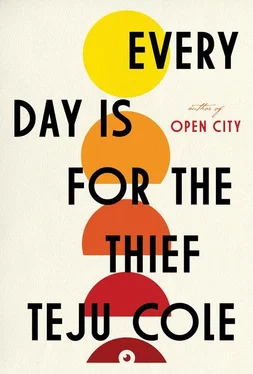The car ahead of us in traffic, a decrepit Peugeot 504, has a sticker featuring a smiling face and the words “Relax! God is in control.” It occurs to me that the barely concealed sense of panic that taints so many interactions here is due precisely to the fact that nobody is in control, no one is ultimately responsible for anything at all. Life in Nigeria, in Lagos in particular, requires constant vigilance. It is entirely possible to put on a happy face, but what no one can really do is relax. A story my aunt tells me brings this home. They had had two dogs, a sleek basenji called Zo and a temperamental bitch they named Maryam Abacha, in honor of the then-dictator’s wife. The dogs died, on the same day. My aunt says that sometimes, before robbers attack a house, they kill the guard dog by throwing poisoned treats over the fence. She thinks it unlikely that their dogs had both succumbed to natural causes: they must have been poisoned. I ask her when it happened. “It was just a few days before you arrived,” she says. I wonder if this means we are due another visit by the armies of the night. The possibility is too terrible to contemplate out loud.
The sight of the empty kennels with their rusting wires unsettles me in a different way. Not fear: it is something much less distinct than that. The feeling lasts through the weeks. It is there as an undertow during the various reunions with friends and family. It is intensified by the sobering sights I see as I roam around the city. Struggle and absence. A dizziness, here among the happiest people on earth. In Nigeria we experience all the good things that texture a life, but always with a sense of foreboding, a sense of the fragility of things. But what if everything that is to happen has already happened, and only the consequences are playing themselves out? That is more troubling still. I have to pass by those kennels each time I come into or leave the compound. They are built right next to each other, set into the concrete walls around the house. They cannot be removed or banished into memory, and the way they sit open now makes them look emptier than when they were new and unoccupied.
The proliferation of new eateries designed on the American fast-food model surprises me. When I left in the early nineties there was just one, Mr. Bigg’s. Now there are several, many of them operating on the franchise system, in every neighborhood of the city. Mr. Bigg’s and its main competitors — Tantalizers and Sweet Sensation — are wellrun establishments serving pastries, burgers, and Nigerian specialties. In general, these restaurants are as clean as the average McDonald’s; they are air-conditioned and they have functioning toilets. The increased competition over the years has helped lower their prices. Mr. Bigg’s started off as a place for the rich to take their kids, but most of the eateries are now priced to cater to the middle class. It is a modest triumph for free enterprise, a small example of something that is being done right in the new Nigeria. To date, none of the big American fast-food chains has opened in Lagos. Their absence is not felt.
There is a Tantalizers restaurant not far from my relatives’ home. Filled with a craving for their peppered snails and stewed spinach with melon seed, I slip out of the house and hire a motorbike to take me there. The motorbike is a good way to get a feel for the city. The commercial motorbike, popularly called okada (after the man who introduced them into the Nigerian market), has a justly earned reputation as an extraordinarily dangerous mode of transportation. The passenger has to hold on to the driver’s waist as he weaves rapidly through traffic, and the two (or sometimes even three) riders absorb into their bodies the shock from every rut in the road and a coat of the city’s fine red dust. Accidents are common. For women, it is too dangerous to ride sidesaddle, so they hike up their skirts to the middle of their thighs and straddle the machine. Many of them wear skirts and traditional wrappers. The motorcycle remains the fastest and cheapest way to travel short distances in Lagos, and even the women do not seem to mind the temporary public intimacies into which it forces them. There have been recurring threats to ban them, but the continuing popularity of the okada seems assured.
Riding back from Tantalizers, I see a sign at the side of the road that says: “Bulletproof your glasses.” I think at first of Clark Kent, then it dawns on me that it is an advertisement for reinforced car windshields. Other signs, put up by churches or herbalists, promise more biological and altogether less likely miracles: “Expect a miracle tonight,” “You will be cured of AIDS and infertility.” And it does seem that, nightly disappointments notwithstanding, most people do continue to expect miracles. When I get home, I take a bucket and fall straight to preparing my bathwater. In this season, the minimum number of showers one must take in a day is two. Most days I take three or more, to combat the heat and wash the dust off my skin. The cooling water and the dark bathroom impart an immediate feeling of deep well-being. The thin armor of dirt lifts. Brown rivulets slither off the body and nose their way into the drain. The world is calm and clean again.
The phone rings as I step out of the bathroom. It is my friend Seyi’s mother. I have three books to deliver to her from her son in New York. Mrs. Aboaba is a distinguished lawyer at a firm on Victoria Island. But these are not law books: Tony Judt’s Postwar , Samantha Power’s A Problem from Hell , and an odd completion to the trio, Lynne Truss’s Eats, Shoots & Leaves . Mrs. Aboaba thanks me for bringing the books for her.
— Do you want to describe the address for me, ma ? I should be able to bring the books round toward the end of this week.
— Oh no, we won’t do that. Too far. I don’t want to inconvenience you. I’ll send someone to pick them up.
— You’re sure, ma ?
— Yes, that’s what we’ll do. Are you home this afternoon? Give me your address, I’ll send someone from my office to your place.
The doorbell rings an hour later. The man at the gate wears a long-sleeved shirt punctiliously tucked into his pleated trousers. He has a slight figure and sharp facial features. He is fair-skinned, and my guess that he is Ibo is confirmed when he introduces himself as Chinedu. I welcome him into the compound and usher him to the living room upstairs.
We sit at the dining table and make small talk. He took the danfo across town, via the Third Mainland Bridge. It was an easy journey, he says, as the morning rush hour was over and the afternoon traffic jams hadn’t started yet. I ask if he would like something to drink and he nods. He must be in his late twenties but, save for one rotting tooth, he looks much younger than that. He still has the air of a schoolboy. I notice that he is impressed — the smile gives it away — when I serve him a can of Pepsi. Only then does it occur to me that because canned soft drinks cost much more than bottled drinks in Nigeria — the opposite of what happens in the United States — the can must seem to him an extravagance. I do not want to watch him drink, but there is nothing else to do. He sips from a glass. Then, to make it clear he is not a mere messenger, he says:
— Actually I’m a law clerk. I went to university actually. Not one of the big guys at the office, not at all, but we do help out with the filing and some research.
And they are also made to run assorted errands, but he doesn’t say that. His manner is shy, but one can see that this is an adaptation. There is a natural volubility in him, something that is being reined in. I want to ask him whether he has a wife, children. I wonder what additional burdens are being carried on these frail shoulders. But I decide against asking. He says:
Читать дальше












